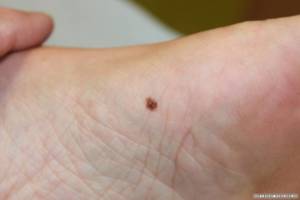New research will investigate the potential for personalised immunotherapies for a group of melanoma patients who do not respond well to current treatments.
The project has been funded through the Australian Skin and Skin Cancer Research Centre, which draws together some of the world’s leading experts from The University of Queensland and QIMR Berghofer Medical Research Institute.
UQ Diamantina Institute (UQDI) Research Chair in Cancer Medicine, Professor Riccardo Dolcetti, said acral melanomas occur on non-hair-bearing skin such as the palms of the hand and soles of the feet.
“As a group these patients do not respond well to the new immune checkpoint blockade treatments, which are of benefit for most melanomas,” Professor Riccardo said.
“Immune checkpoint inhibitors reactivate a patient’s immune response to heavily mutated tumours.
“Acral tumours have been shown to have a relatively low mutation burden compared to those melanomas associated with ultraviolet radiation exposure.
“However, recent studies have challenged the notion that all patients with acral melanoma would not respond due to the low immunogenic potential of this tumour.”
Acral melanomas account for two to three per cent of melanomas diagnosed in Australia, and are more prevalent among Asian populations than Caucasians.
The head of QIMR Berghofer’s Oncogenomics Laboratory, Professor Nick Hayward, said the project would identify a sub-set of acral melanoma patients who might benefit from immunotherapy.
“We are bringing together a team of researchers with specific expertise to assess mutations and immune responses associated with acral melanomas.
“We believe this will be the first comprehensive characterisation of the immune potential of acral melanoma, providing the rationale to support personalised immunotherapies for these patients.”
Drs Michelle Teng and Antonia Pritchard from QIMR Berghofer are also investigators on the study.
ASSC Enabling Grants to support collaborative research projects between UQ and QIMR Berghofer were announced at the annual Alan Cooper Epiderm Lecture at UQ’s Diamantina Institute.
2017 ASSC Enabling Grant Awards:
Professor Riccardo Dolcetti, Research Chair in Cancer Medicine, UQDI: Identification of immunogenic neo-epitopes from acral melanoma for cancer immunotherapy.
Associate Professor Kiarash Khosrotehrani, Experimental Dermatology Group Leader, UQ Centre for Clinical Research and UQDI: Pilot study to evaluate feasibility of a skin genome-phenome-microbiome project.
Associate Professor Michael Piper, UQ School of Biomedical Sciences: Development of an in vitro model for perineural invasion of squamous cell carcinomas of the head and neck.
Associate Professor Helmut Schaider, Dermatology Research Centre, UQDI: Preventing permanent drug resistance in melanoma by targeting OGT-TET1.
Dr James Wells, Senior Research Fellow, UQDI: Characterisation of inflammatory signatures to enable rapid diagnosis of suspicious skin rashes.
Media: Professor Riccardo Dolcetti, r.dolcetti@uq.edu.au; Kim Lyell, k.lyell@uq.edu.au, 0427 530647.




